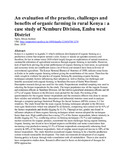| dc.description.abstract | Kenya is a signatory to Agenda 21 which embraces development of organic farming as a production system that respects natural cycles. Kenya is mainly an agrarian economy and therefore, for her to attain vision 2030 which largely hinges on exploitation of natural resources, sustainable utilization of agricultural resources through organic farming is inevitable. However, lack of hard facts proving the actual performance of organic farming in rural areas; in agronomic and economic terms are insufficient since a lot of focus and research have been in favour of conventional agriculture.
The Kenya National Bureau of Statistics of 2010, indicate some farms in Embu to be under organic farming without giving the contribution of the sector. Therefore the study sought to evaluate the practice of organic farming by examining organic farming techniques adopted, factors influencing their adoption as well as finding out challenges and benefits associated with organic farming in Nembure Division of Embu West District.
Descriptive research design was used for the study. Proportionate stratified sampling was used in selecting the farmer respondents for the study. The target population was all the organic farmers and extension officers in Nembure Division. All the twelve agricultural extension officers and 60 (37%) of organic farmers in the Division were picked for the study. Pre-testing of the questionnaires for the organic farmer respondents and the extension officers was done to ensure their validity and reliability. Basic descriptive and inferential statistics were used in analysis through a computer package Statistical Package for Social Sciences (SPSS) version 11.5 for windows.
The study found that the main organic farming techniques adopted in the Division were agro-biodiversity which was adopted by all farmers, composting was carried out by 93% of the farmer respondents and double digging by 83.3%. Through at-test, gender was found to influence adoption of these organic farming techniques where women adopted the techniques faster than men.
High certification fees among 57% of the farmer respondents, labour intensity in double digging (61.7%), conflicting advice on farming techniques (76.7%) and inadequate market incentives for organic produce; constituted the main challenges facing organic farming. Organic farming was found to have helped improve soil fertility and water conservation thus increasing crop production among 83.3% of farmer respondents consequently enhancing food security to 90% of the farmer respondents. Sale of surplus meant improved income to 80% of the farmer respondents.
The study therefore considered organic farming to be a feasible production system towards sustainable development. The study recommends development of an organic farming policy in Kenya through wide consultation with all stakeholders. There is also need to have comparative studies done. Research effort need to focus on development of dosages for EPM approaches. | en_US |

